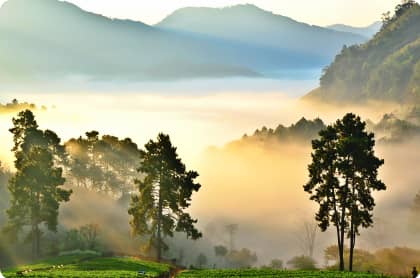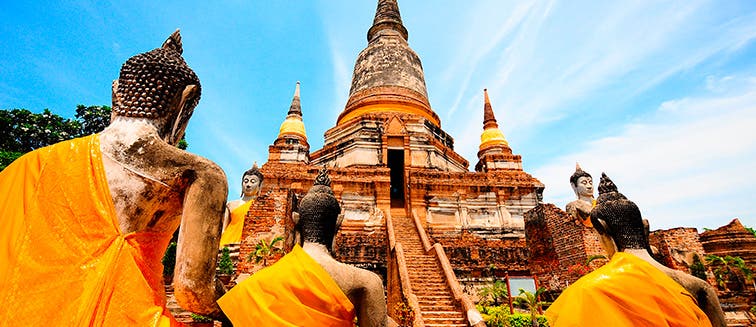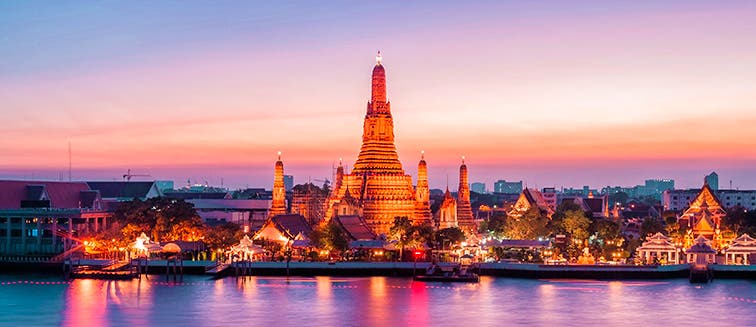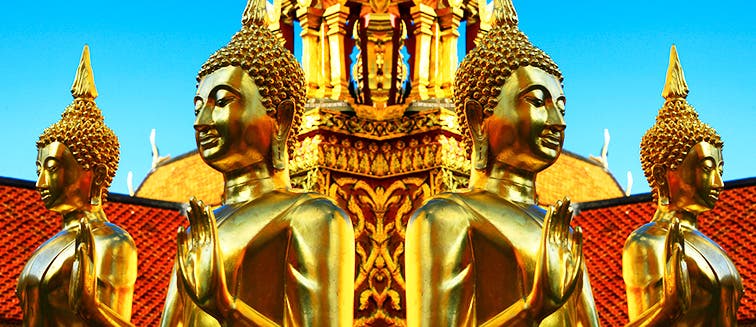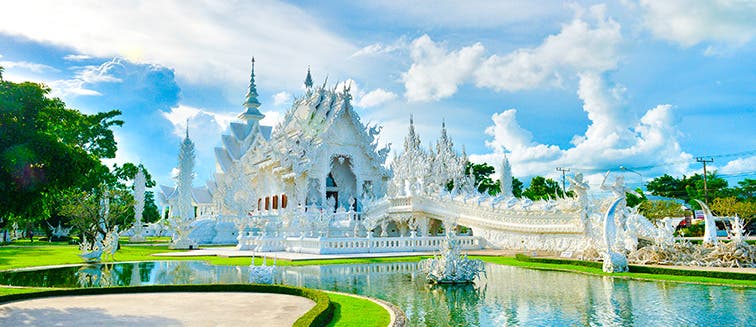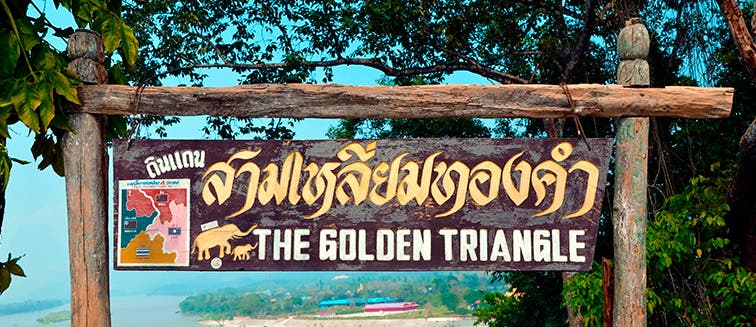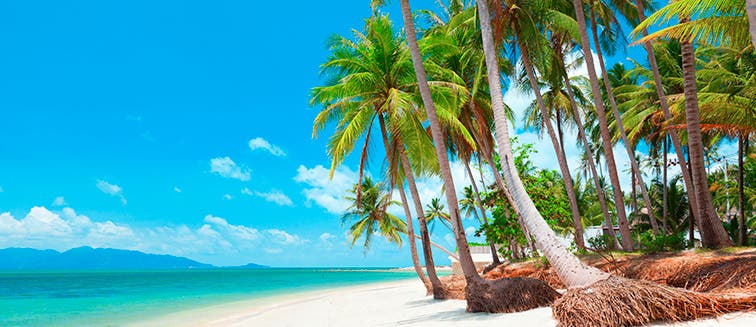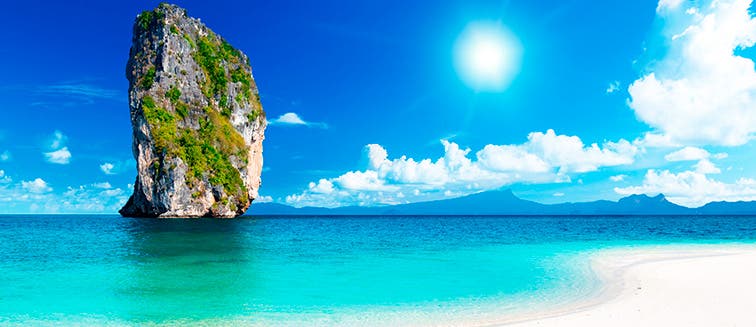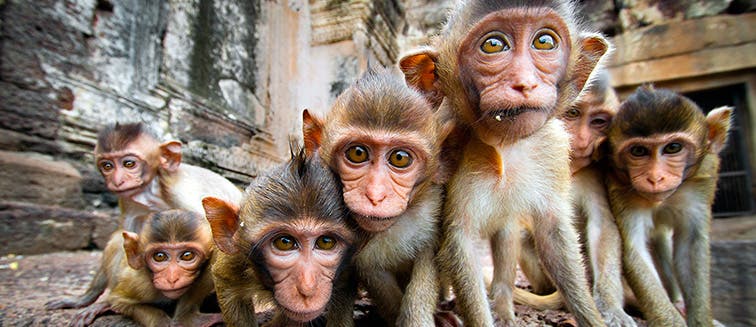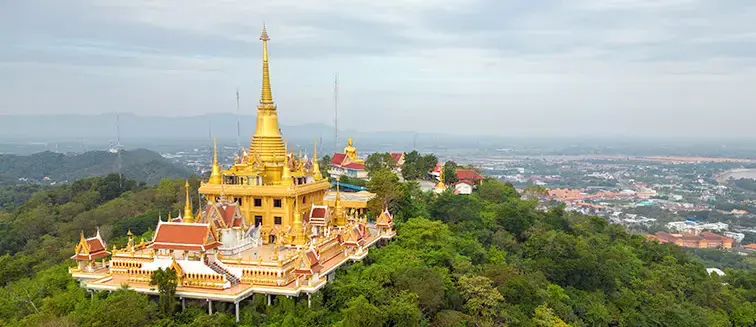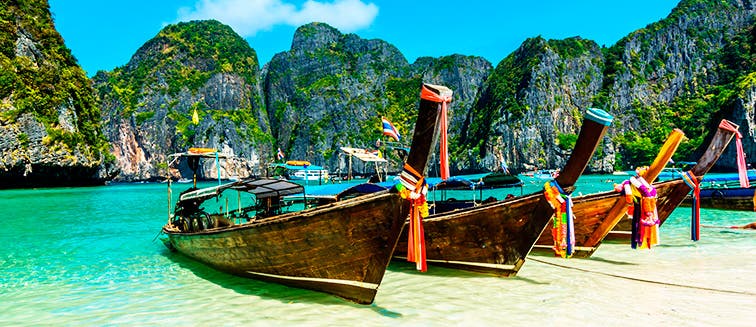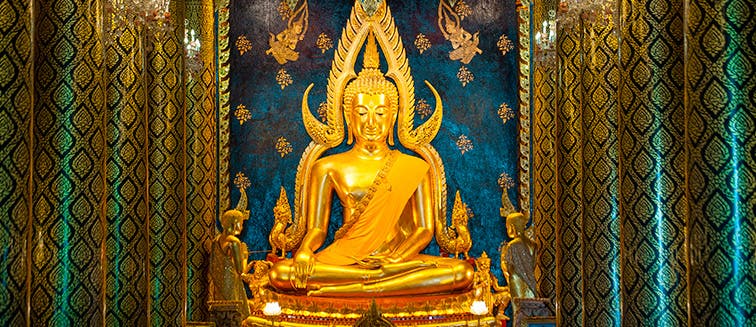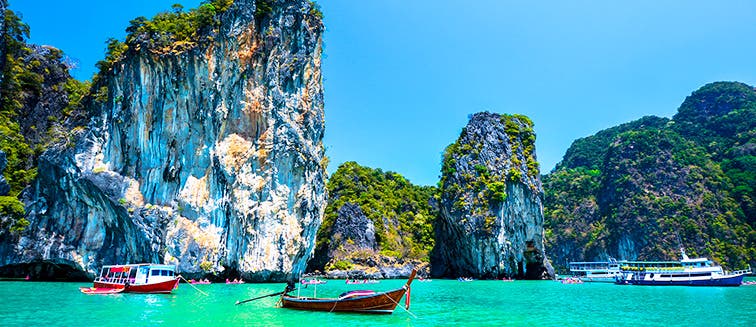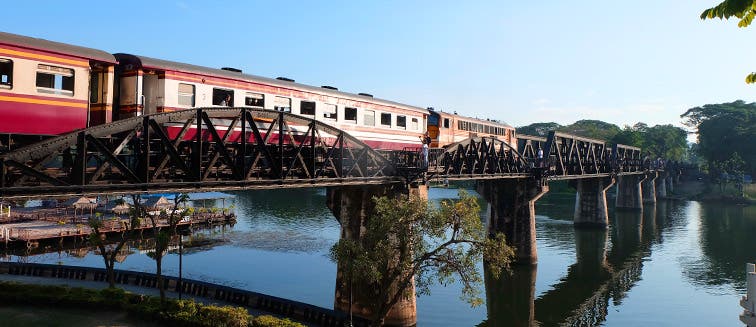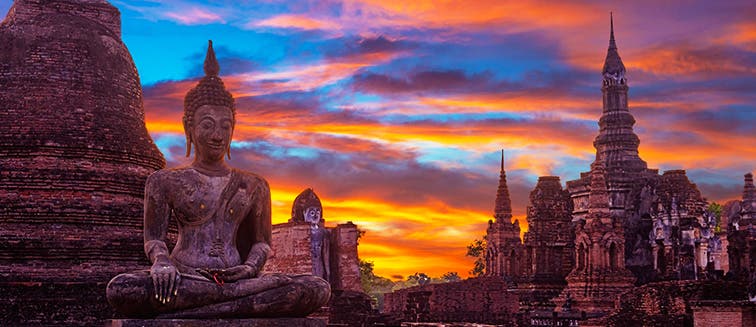A vacation to Thailand is one of the most popular travel experiences in Southeast Asia. The country continues to attract the public thanks to its fantastic mix of spectacular beaches, temples, delicious cuisine, a variety of activities and its cheerful locals. Located in the center of Southeast Asia, on the Indochina Peninsula, the Kingdom of Thailand is a dazzling treasure of the East. Its shares a border on to the east with Laos, on the southeast with Cambodia and the Gulf of Thailand, on the south with Malaysia and on the west with Myanmar and the Andaman Sea.
Its 69 million inhabitants are distributed along 1770 kilometers from north to south and 805 kilometers from east to west in 76 provinces, which have the same name as their corresponding capital cities. Bangkok is the most populated and has the highest population density. On a tour of Thailand, you will be amazed by the kindness of its inhabitants; it has even been granted the nickname of ‘The Land of Smiles’.
The most mountainous area can be found close to the border with Myanmar and the highest peak is the Doi Inthanon at 2595 meters and is located to the north, in the province of Chiang Mai. Its two main river systems are the Chao Phraya, which provides drainage for 35% of the country and runs through the heart of Bangkok and the Mekong River, which serves as a natural border with Myanmar and Laos in the famous Golden Triangle.
Thailand enjoys a humid tropical climate with temperatures ranging between 15 and 35 degrees Celsius. The monsoon season runs from June to October, and the coolest months are from November to February. The remainder of the year is delightfully warm.
Nature in Thailand
Thailand has a varied landscape, ranging from woodland to tropical mangroves, in the form of forests and jungles, which covers 25% of the country and which together with the plateau, exhibits exuberant specimens of mangroves, Indian reeds, ebony, teak, oak , pines, bamboos, palms, ratans, lianas, fruit trees such as coconuts, mangoes and bananas and up to 27,000 species of plants and flowers such as fistula, orchids, hibiscus or gardenias.
The more than 100 national parks have a fundamental role in the protection of the 313 species of reptiles, 107 of amphibians, 900 of birds and 300 species of mammals that can be found in the country, such as elephants, tigers, monkeys, leopards, wild oxen, buffalos, tapirs, snakes and crocodiles. Thailand also has exceptionally rich marine life including reef fish, sea cow, crossbow fish, whale shark, and giant spider crabs, ensuring scuba diving is one of the most common activities for visitors on a trip to Thailand.
Economy in Thailand
The Thai economy is supported by agriculture, rice cultivation, duck, pig, ox and cow farming and fishing in the Andaman Sea, Gulf of Thailand and the Mekong River. Being one of the ten most visited countries in the world, tourism represents one of the main sources of income and has produced many job opportunities for its inhabitants.
It is a very well connected country and has a large transport network, so it is an easy country in which to enjoy a tour. It has 25 airports and many international airlines land in Bangkok, one of the most important airports in Asia. It has an extensive network of roads that move buses, minivans, cars, and motorcycles; the railways connect the most important cities of the country; A large number of private ferry companies connect the many islands and the best options to get around the capital's streets are the subway, the metro, the taxi or on a traditional tuk-tuk.
Religion in Thailand
75% of Thailand’s inhabitants belong to the Que Tai and Lao ethnic groups, the vast Chinese community represents about 15% of the population and the remainder of the country’s inhabitants are either Malays, Mon, Khmer and indigenous tribes from the highlands.
95% of the population follows the Buddhist Theravada school of belief, 4% are Muslim and the remaining 1% identify as either Hindu, Christian, Confucian or Taoist. Thai men usually enter temporarily into a monastery for about three months after finishing their university studies. In the time they are there, they are novice monks and they can decide freely when to leave it. The reason why they do this is to cleanse their mind, earn merit and honor their parents.
History of Thailand
A package holiday to Thailand will undoubtedly bring you face-to-face with the living monuments of the country’s vast history. The oldest archaeological site in Thailand dates from 3600 BC but the founding of the nation was established in 1238 with the Kingdom of Sukhothai until 1365 when it was replaced by the Kingdom of Ayutthaya. After the fall of this kingdom in 1767, at the hands of the Burmese when the capital was devastated and burned, it was moved to Thonburi under the mandate of King Taksin the Great. In 1782 the reign of Siam passed to the Chakri dynasty with Rama I, who declared Bangkok the new capital.
The absolute monarchy of Rama VII became constitutional as a result of the coup d'état of 1932. During the Second World War, Thailand was allied with Japan, but during the final stages of the war, it unified with the United States. In 1946 Rama IX came to the throne and in 1949, Siam changed its name to Thailand. After 17 violent attempts to seize political power and years of political instability, in 2014 the army staged a new coup d'etat. In 2016 the beloved king died, putting an end to the most enduring reign in the world. After seven decades of rule, the king was succeeded by his son Rama who found himself under a military dictatorship. Despite the attempts, it is the only Southeast Asian country that has never been colonized by a European power.
Culture and Traditions in Thailand
The Thais have had a centuries-long special relationship with elephants, or ‘chang’, as they call them. These immense and beautiful creatures have been a fundamental part of the culture and appeared on the national flag until 1917. Throughout history, these noble animals have been domesticated and have assisted in the construction, transport, and warfare. The importance and admiration for them are also reflected in Buddhist and Hindu beliefs and mythological legends giving them a mystical power and making them bearers of good luck. They are a true symbol for the country.
It is true that elephants in Thailand have also been the object of abuse, ill-treatment, and illegal trade, but fortunately, there are institutions that ethically rescue, care for, treat and feed them.
The picturesque floating markets are another of the Thai traditions and an essential visit on a holiday to Thailand. A universe of canals, canoes, and houses on stilts, these floating markets are a unique insight into the daily lives of the locals as they buy and sell fruits, vegetables, crafts, and freshly cooked dishes.
Thai boxing or ‘Muay Thai’ is a popular martial art and is considered a national sport. In the Kingdom of Sukhothai, it was part of the military training of the soldiers.
Thai massages are another hallmark of the country and follow an ancient philosophy. The technique was created 2,500 years ago by Dr. Shivago, Buddha's physician, in which he combined different Asian techniques, Ayurvedic principles, and yoga postures. You cannot fully experience a tour of Thailand without enjoying one of these wonderful massages. The technique consists of strong pressure and stretches in which the therapist uses their hands, fists, elbows, knees, feet, arms and legs in order for the recipient to achieve physical, mental and emotional balance. There are countless massage parlors throughout the country and the prices are very cheap.
Embarking on a comprehensive tour of Thailand takes visitors through a fascinating and varied territory with a vast history to discover a country that will surprise you with its unique landscapes and variety of traditions. The country is a heavyweight in tourism and it is well deserved. Everyone wants to go and discover the country for themselves and whoever has visited always wants to return to explore further.
Why is Thailand the most popular destination in Asia?
The answer is simple; because it has everything; a rich historical heritage, the fruit of the kingdoms of Siam and Lanna; ancestral traditions and rigorous customs; a sublime artistic legacy that is reflected in the delicacy and beauty of its temples; captivating cities, well connected to each other; a bustling capital city; a dreamlike landscape that stretches from the lush mountain forests of the north to the idyllic islands of the south with magnificent beaches of fine sand and warm crystalline waters; national parks and nature reserves full of exotic wildlife, frantic cities and quiet rural areas, a delicious aromatic cuisine, a warm climate, accommodations of all kinds and for all budgets, virgin landscapes in which to practice sports such as hiking, snorkeling, kayaking, cycling, sailing or rafting, a lively nightlife and a mystical and spiritual environment; numerous modern shopping centers and street markets, an infrastructure prepared for tourism and affordable prices; and the most important thing, kind and friendly locals who always greet visitors with an unbreakable smile, infecting you with their infinite joy and their caring, tolerant and educated attitude, perhaps the fruit of Buddhist teachings. Hence the Thai proverb, ‘do good and receive good, do evil and receive evil’.
A holiday to Thailand means entering into the deepest and warmest of Asian traditions. Its millenarian culture is a reference point and attracts, like a magnet, the western tourist who seeks traveler enrichment and open-mindedness. The capital, Bangkok, is a bustling and extensive city, with a cultural treasure that deserves to be given time before leaving for one of the more than one hundred tropical islands that are distributed between the Gulf of Thailand or the Andaman Sea, always a highlight in all-inclusive trips to Thailand. On these islands, you can find young people in search of nightlife and also those who seek silence or solely the whisper of the waves. And for the most restless, the north of the country offers all the possibilities and the mystery of the jungle in the Golden Triangle of Thailand.
Thailand is a land of freedom. When you step foot in the country it seduces you with what you see, hear, taste, smell and feel. That's why traveling to Thailand means immersing yourself in an unbeatable cocktail of floating markets and tuk-tuks, pad thai and tropical fruits, waterfalls and lakes, skyscrapers and houseboats, lanterns illuminating the night sky, sun and rain, sea and mountains, monks with saffron robes and Buddhist rituals, rivers and forests, flowers and offerings, caves and coral reefs, golden Buddhas and temples with pointed roofs.Thai’s are experts at making floral arrangements that they exhibit as ornamentation in their sacred places. Mythical Thailand is like a flower; delicate, colorful, aromatic, beautiful, wild, romantic and natural. Do not hesitate to explore; a magical trip awaits you.

